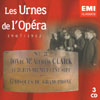(Les) Urnes de L'Opéra
Great voices from a distant past singing across a century’s divide
View record and artist detailsRecord and Artist Details
Genre:
Opera
Label: EMI Classics
Magazine Review Date: 9/2009
Media Format: CD or Download
Media Runtime: 222
Mastering:
Mono
ADD
Catalogue Number: 206267-2

Author: John Steane
They have now been transferred to three compact discs (a pocket-sized urn would be enough for them), and part of the interest now lies in the nature of the selections. None of the composers represented is earlier than Mozart, and there is nothing more “modern” than Puccini and Reynaldo Hahn. A large proportion of the music (32 items out of 62) is French, but with no Debussy or Ravel. One track of less than four minutes of Beethoven and another of Wagner does for the Germans, and England, it seems, is still the land without music. Most of the artists are singers, many of these too (17 out of 40) French. Virtuoso instrumentalists such as Paderewski, Kubelík and Kreisler are heard, and in full military glory, the band of the Coldstream Guards.
Playing them now, we may experience the authentic shiver of recognition from time to time – the infinite subtlety of Fernando De Lucia singing the opening of the love duet from Les pêcheurs de perles, Pol Plançon serenading with endless resources of voice and refined devilry, the young Caruso opening “Bella figlia dell’ amore”, Jan Kubelík playing with puckish agility, lightness and zest. Much else has a flawed distinction, and some (Patti’s Don Giovanni, for instance) will leave today’s listeners frankly puzzled.
For my own part, I am saddened by the way in which modern technology – conscientious no doubt, and highly developed – has presented the ancient treasures. The best of the transfers are startlingly good, and perhaps one can say of all that the originals have never been reproduced with greater clarity. But a hardness, amounting to distortion, particularly on high and loud notes of many of the singers suggests, I suspect, that such clarity has been gained at too high a price. There is no space here to list or review individual collectors’ pieces. The set opens, for instance, with the excellent Marguerite Mérentié singing rare arias from Massenet’s Ariane. They are not so many or so spectacular as one may have hoped, but this set of compact discs is still definitely a collector’s piece in itself.
Discover the world's largest classical music catalogue with Presto Music.

Gramophone Digital Club
- Digital Edition
- Digital Archive
- Reviews Database
- Full website access
From £8.75 / month
Subscribe
Gramophone Full Club
- Print Edition
- Digital Edition
- Digital Archive
- Reviews Database
- Full website access
From £11.00 / month
Subscribe
If you are a library, university or other organisation that would be interested in an institutional subscription to Gramophone please click here for further information.




